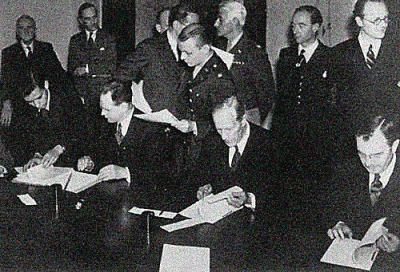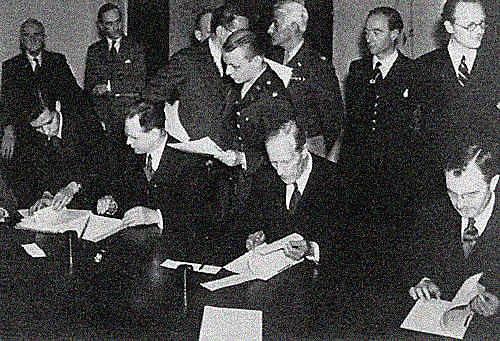
The signing of the War Crimes Commission agreement in 1945.
The Commission ceased its operations in March of 1948, a casualty of the toxic Cold War politics that quickly spread following the end of the war. However, by its conclusion, the UNWCC had investigated over 30,000 individuals in Europe and East Asia and established crucial standards for fair international trials. The records of the Commission’s activities — essentially, the documentation of the birth of modern international criminal law — were sent to the archives at the newly formed United Nations Organization, where they have remained, largely untouched and forgotten, for nearly 70 years.
Last fall our research team at the War Crimes Project of the Centre for International Studies and Diplomacy at the University of London paid a visit to the United Nations Archives in New York City. Our mission: to explore the long forgotten records of the Commission in search of lost secrets from the development of international law.
It turns out this is more complicated than it sounds.
Since their creation, all UNWCC records have been classified. United Nations rules dictate that in order to access these archives, researchers must first gain the support of their national government. The national government then sends a letter of endorsement along to the Secretary-General, who ultimately determines if the applicant may access the archives. All of us initiated this process in the spring of 2011. Months later when we arrived in New York, our British colleague, Dr. Dan Plesch, had been granted access while we still awaited word from the State Department.
The archive includes approximately 32,000 case files detailing the work of the first international criminal justice initiative of the modern era. Buried within them are valuable descriptions of the evolution and codification of international criminal law. These are priceless and pertinent relics from a period when mankind was seeking to regain its humanity after the Second World War.
This is an important piece of history that remains hidden from modern discourse. The common narrative about World War II is that the Allied Powers fought together to save Europe and the Jewish people from the tyranny of Hitler and his allies. Furthermore, it is commonly held that international criminal law was only established and exercised against those major criminals tried in Nuremburg and Tokyo.
Both of these narratives are incomplete.
Today, nearly 70 years after the end of World War II, the international community continues to struggle to say the word “genocide” loud enough for its people to hear. UN initiatives to bring justice for the world’s most heinous crimes remain highly contentious. Critics lambast modern tribunals for their exorbitant costs, lengthy duration, and over-reliance on Western legal principles. Furthermore, a pervasive lack of knowledge or regard for human rights laws has led to continued violation of international statutes and norms clearly declared in the years following the Second World War. Torture and wars of aggression are two such examples.
As violent conflict continues to ravage many parts of the world, now is the time to enrich our historical understanding of international law and allow the valuable legal precedents set by the UNWCC to be investigated thoroughly. The UNWCC records must be declassified and opened immediately.
Shanti Sattler is a program associate with the War Crimes Project at the Centre for International Studies and Diplomacy at the University of London’s School of Oriental and African Studies.
Greg Chaffin is a research assistant for the Centre for International Studies and Diplomacy at the University of London.
